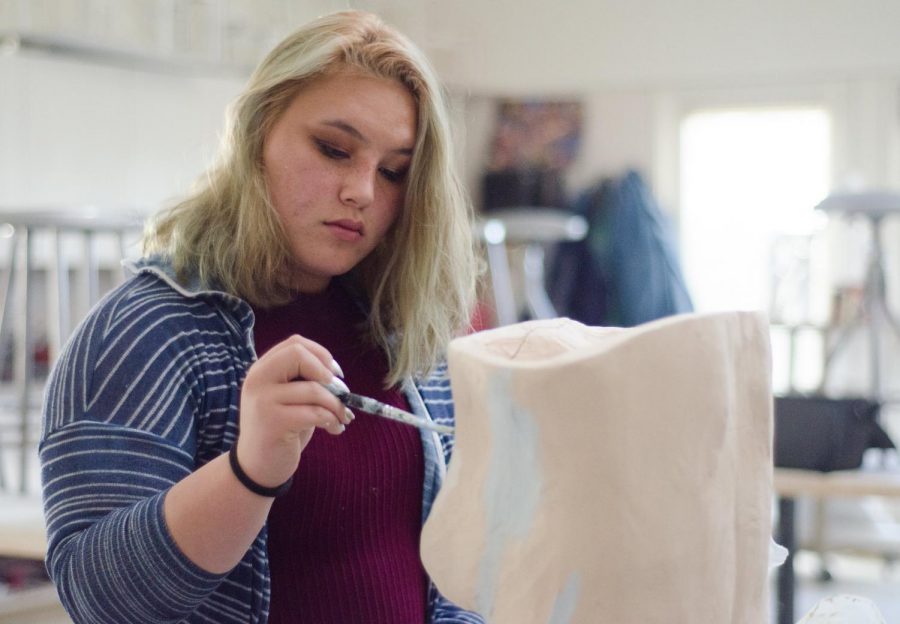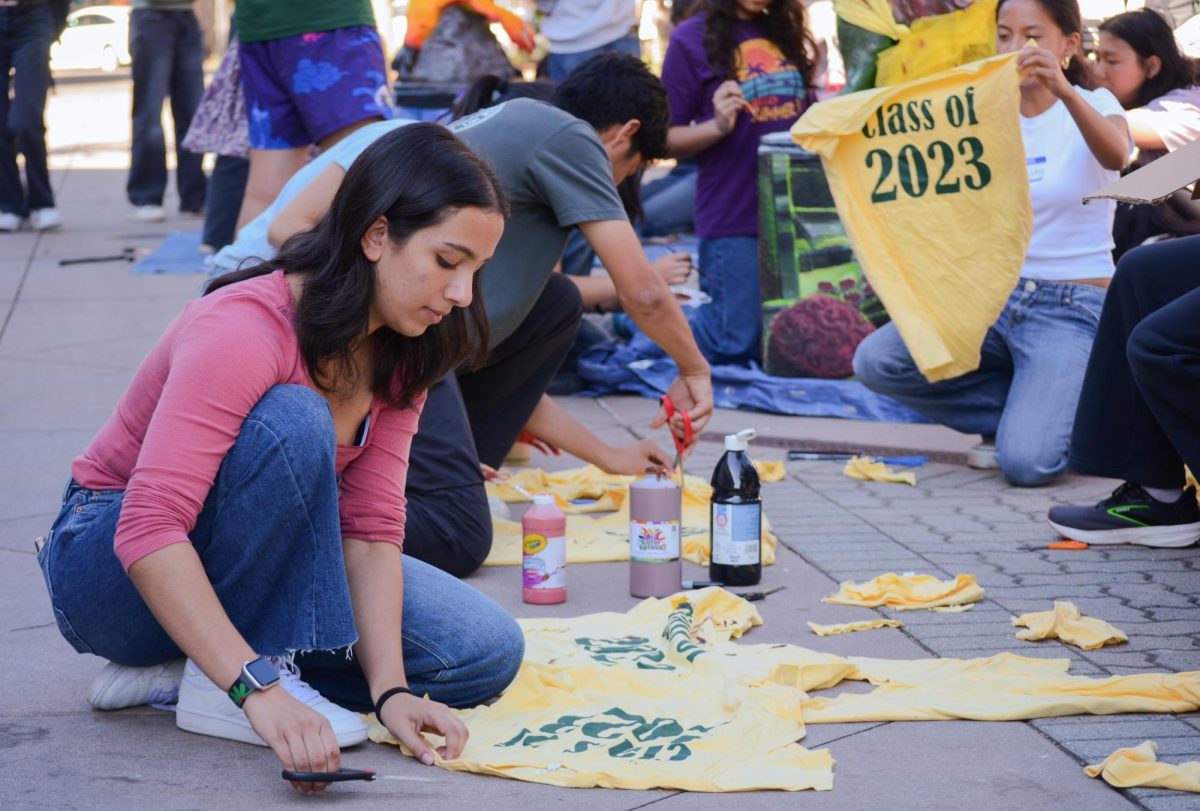Humans of Harker: Aislinn Coveney creates art to make a statement
“I’m going against Oscar Wilde right now,” Aislinn Coveney (12) said. “He said that ‘art is not an imitation of life.’ I disagree with that wholeheartedly. With art, because you’re using pictures to depict what you see around you, it should be more powerful than words. I’m not good with words, but someone who is, like a writer or an author, can write these things out, but those are perceived messages. You can take those words and twist them, and they can mean whatever you want. But with art, I feel like it’s more symbolic. You see what’s in front of you, and it’s received information. You look at the art, and straight up, you know this is what I want you to see.”
March 2, 2018
Few students would dare contradict Oscar Wilde, but Aislinn Coveney (12) is one of them.
“He said that ‘art is not an imitation of life.’ I disagree with that wholeheartedly,” she said. “With art, because you’re using pictures to depict what you see around you, it should be more powerful than words. I’m not good with words, but someone who is, like a writer or an author, can write these things out, but those are perceived messages. You can take those words and twist them, and they can mean whatever you want. But with art, I feel like it’s more symbolic. You see what’s in front of you, and it’s received information. You look at the art, and straight up, you know this is what I want you to see.”
Consistent with her feminist ideals, Aislinn decided to create a model of a nude female body for her art class.
“My idea right now is actually on objectification on women in society, as opposed to women breaking free from the societal change of the patriarchy,” she said. “With objectification, like for my example, I decided to depict the female form, like a nude female form. At first I was really uncomfortable with it, but I forced myself, ‘You need to do this otherwise you’re never going to get your message across.’ ”
Her art teacher, Pilar Aguero-Esparza, broke into a grin when she heard Aislinn’s name. She noted Aislinn’s symbolic use of color, her work “rooted in realism” but with expressionistic flair.
“Aislinn has a big heart,” she said. “She’s a big feeler. I think that’s definitely one of her strengths. I think my first impression of Aislinn was that she was very reserved, at the beginning, like most students. I’ve seen her really become empowered in terms of her sense of self, and in her viewpoints about being a woman.”
However, Aguero-Esparza made the distinction between cynicism and outspokenness — she said that Aislinn is the latter.
“She speaks her mind, but she’s not mean or negative,” Aguero-Esparza said. “Sometimes, kids and teenagers can have a bad day, so sometimes we get kids with an attitude which is kind of hard to overcome, especially in a field like art when we have to critique each other and look at each other’s work. She’ll look at things and she’s very kind, but she’s also very firm.”
This firmness translates to the soccer field, where Aislinn plays goalie for the varsity team.
“The soccer team has definitely helped me become more caring, and definitely more aware of what I say,” she said. “Because on the field, I’m supposed to yell at them and that made me feel bad a lot of the time, but that’s just the role of a goalkeeper! I also realized that it didn’t translate well, so I would have to communicate to them ‘I love you guys, and I don’t want to have to hurt you, but this is what I have to do.’ … It’s just always a good time with them, and they’re sort of like a pillow — really comforting and warm, and at the end of the day, we all love each other a lot.”
She found a similar community in martial arts. After quitting after an initial few years, a case of serendipity brought her back into the studio.
“One day, I came back to the martial arts studio that I’m currently in, and my friend called me up and said, ‘Hey, I’m testing for my third degree, do you want to come and watch?’ and I said, ‘Sure!’ because I hadn’t been there in so long,” she said. “After a while, I just started going back and watching their classes, and my master instructor would be like, ‘Aislinn, get back on the floor. I don’t care if you don’t have a uniform, I just want you to practice.’ So I went back, and eventually got my second degree black belt.”
She finds that both karate and art helped her appreciate the untapped strengths of the human body.
“[Karate] acts as a sort of therapy for me, ‘cause I’ve been through a lot of difficult things in my life, and it just lets me let out all the emotion I have, along with art, because martial arts is a really beautiful thing,” she said. “You can use it to protect yourself, or use it to show off your body, or the moves that you do. It’s helped me not only make friends, but it’s helped me become more confident in myself not only as a person, but as a martial artist. I’m currently teaching at my karate studio as well because I spend a lot of time there, and it’s really nice to see the kids develop to be good people. It’s not even about the sport, it’s about them developing good characteristics based off of how you show yourself as a role model. I want to be a good role model and teach them good things.”


















![“[Building nerf blasters] became this outlet of creativity for me that hasn't been matched by anything else. The process [of] making a build complete to your desire is such a painstakingly difficult process, but I've had to learn from [the skills needed from] soldering to proper painting. There's so many different options for everything, if you think about it, it exists. The best part is [that] if it doesn't exist, you can build it yourself," Ishaan Parate said.](https://harkeraquila.com/wp-content/uploads/2022/08/DSC_8149-900x604.jpg)




![“When I came into high school, I was ready to be a follower. But DECA was a game changer for me. It helped me overcome my fear of public speaking, and it's played such a major role in who I've become today. To be able to successfully lead a chapter of 150 students, an officer team and be one of the upperclassmen I once really admired is something I'm [really] proud of,” Anvitha Tummala ('21) said.](https://harkeraquila.com/wp-content/uploads/2021/07/Screen-Shot-2021-07-25-at-9.50.05-AM-900x594.png)







![“I think getting up in the morning and having a sense of purpose [is exciting]. I think without a certain amount of drive, life is kind of obsolete and mundane, and I think having that every single day is what makes each day unique and kind of makes life exciting,” Neymika Jain (12) said.](https://harkeraquila.com/wp-content/uploads/2017/06/Screen-Shot-2017-06-03-at-4.54.16-PM.png)








![“My slogan is ‘slow feet, don’t eat, and I’m hungry.’ You need to run fast to get where you are–you aren't going to get those championships if you aren't fast,” Angel Cervantes (12) said. “I want to do well in school on my tests and in track and win championships for my team. I live by that, [and] I can do that anywhere: in the classroom or on the field.”](https://harkeraquila.com/wp-content/uploads/2018/06/DSC5146-900x601.jpg)
![“[Volleyball has] taught me how to fall correctly, and another thing it taught is that you don’t have to be the best at something to be good at it. If you just hit the ball in a smart way, then it still scores points and you’re good at it. You could be a background player and still make a much bigger impact on the team than you would think,” Anya Gert (’20) said.](https://harkeraquila.com/wp-content/uploads/2020/06/AnnaGert_JinTuan_HoHPhotoEdited-600x900.jpeg)

![“I'm not nearly there yet, but [my confidence has] definitely been getting better since I was pretty shy and timid coming into Harker my freshman year. I know that there's a lot of people that are really confident in what they do, and I really admire them. Everyone's so driven and that has really pushed me to kind of try to find my own place in high school and be more confident,” Alyssa Huang (’20) said.](https://harkeraquila.com/wp-content/uploads/2020/06/AlyssaHuang_EmilyChen_HoHPhoto-900x749.jpeg)









